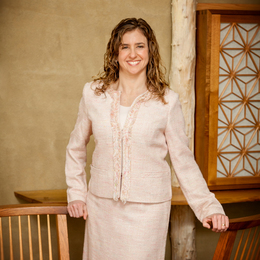
Divorce is never an easy path, often complicated by the burden of complex emotional, financial and family issues. Fortunately, skilled attorneys such as Elissa C. Goldberg are adept at guiding clients through a divorce and parting with a spouse on the most amicable terms possible. Through collaborative divorce and mediation, she can help her clients move on with their lives in ways that take less time and offer each individual a greater stake in the decisions that will impact their respective futures.
“For many people, collaborative divorce and mediation are better alternatives to the traditional divorce process,” says Goldberg, who has been a member of the Pennsylvania Bar since 1995 and the New Jersey Bar since 1994. She is also a board member of the Bucks County Collaborative Law Group. “Both collaborative divorce and mediation are team approaches so that each party—husband and wife—is contributing and is actively involved with all aspects of decision making.”
Collaborative divorce is unique in that it allows couples to discuss the terms of their union’s dissolution outside of the courtroom, with the help of a network of experts in law, finance and mental health. Each party is represented by a family law attorney with specialized training in collaborative law. Unlike traditional means of litigation, Goldberg suggests, collaborative divorce enables divorcing spouses and their lawyers to work together to best meet each person’s immediate and future goals. There is full disclosure so that each person knows the other’s debts, assets, income and other pertinent information.
Because the collaborative divorce process takes place outside of the courtroom, involved parties have the benefit of not leaving their personal matters for a judge to decide. Also, staying away from the courtroom allows for a far less stressful experience for families who don’t want to burden their children with tense and even traumatic custody issues. Further, collaborative divorces tend to allow involved parties to achieve closure in a quicker fashion, which helps people move on to the next phase of their lives as soon as possible.
Collaborative divorce is also ideal for people with significant assets “who want to preserve their assets,” Goldberg says. “Together, we create equitable distribution settlements, with the input of the clients, so clients are comfortable, secure and feel that their individual needs are being met. Oftentimes, we make suggestions to divide the marital assets in such a way so as to avoid excessive taxes.
“In addition to having a team of lawyers at the parties’ disposal, we often utilize outside resources, such as a divorce coach, who works to ease the stressful and often confrontational aspects of divorce,” she continues. “Even if the two parties are on amicable terms and they want to resolve issues in the best way possible, divorce is fraught with emotion. The divorce coach helps negate a positional approach, focuses on what the parties are really saying, and delves into the reasons behind their stances on certain issues.” This process ultimately streamlines the parties’ negotiations.
In addition to divorce coaches, the divorcing couple may also utilize neutral financial experts. These professionals have “no vested interest” in the matters at hand and can be hugely beneficial because they help people assess debts and assets and, ultimately, meet their individual monetary goals for the future. Such professionals can include accountants, financial planners, mortgage brokers and realtors. “We work as a team to best help clients,” Goldberg says.
Another means by which couples pursue an amicable divorce is through the use of a mediator, a role Goldberg is also trained to fill. During mediation, Goldberg doesn’t act as an attorney at all. Instead, she explains, her job is to “facilitate conversation.” As a mediator, she actively initiates discussion with the parties so that they amicably resolve such issues as custody, the division of assets and support. When the couples agree on these issues, Goldberg then drafts a memorandum of understanding. From there, couples are free to pursue outside attorneys to review the memorandum and file the necessary paperwork to finalize the divorce process. However, at that stage, an attorney’s role is minimal, and therefore the expenses are few, as the parties have done the hard work themselves.
Goldberg, who earned her doctorate, with honors, from Temple University School of Law in Philadelphia, says that helping people through difficult life transitions is why she chose to pursue a career in family law in the first place. She considers such events “hand-holding experiences” that require the expertise of a qualified, passionate and caring professional; she has remained actively involved in each and every case that has come through her office in the nearly 20 years she has been practicing in Doylestown.
“People call the office when they are scared and anxious, and I understand that,” she says. “We help them through the process and empower them. If they are actively involved in the decision making, they are more vested and satisfied with the outcome.”
If you would like more information to discuss the specifics of your situation, contact the Law Office and Mediation Services of Elissa C. Goldberg for an initial consultation without any charge.
Law Office and Mediation Services of Elissa C. Goldberg
107 N. Broad Street, Suite 211
Doylestown, PA 18901
215-345-5259 | www.elissagoldberg.com
Photograph by Allure West Studios


